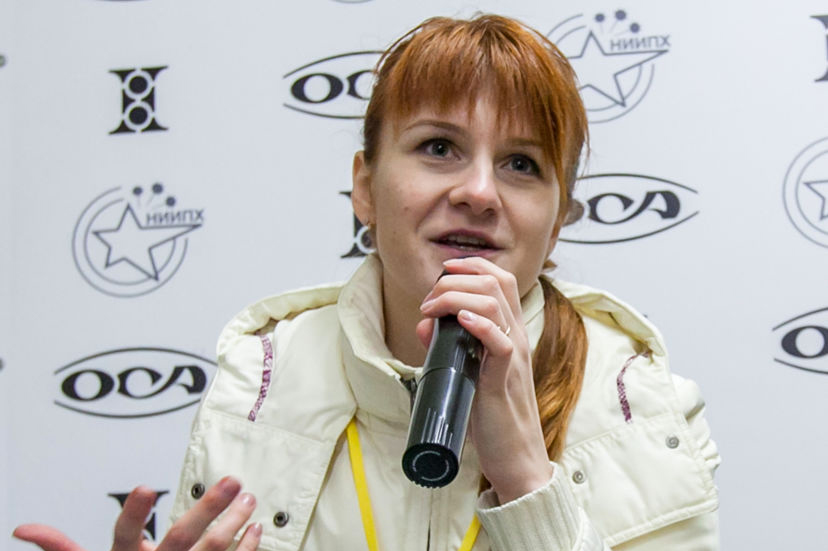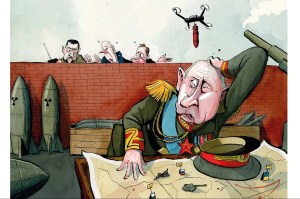To much fanfare and glee last week, federal prosecutors announced a plea deal had been secured for Maria Butina, the mystery woman who populated DC conservative circles for a short period around the 2016 election. The popular interpretation of her travails, circulated with gusto in the press since her arrest in July, was that Butina – an attractive young woman, and, most damningly, a Russian national – had used her sexual prowess to trick gullible middle-aged Republican men into granting her access. She did this, or so the story went, at the behest of her menacing benefactors as part of the sprawling Kremlin campaign to ‘interfere’ in American politics.
It’s true that Butina attended conferences, met prominent political figures, and hashed out plans to exert influence in service of pursuing a policy agenda. But in a different context, all these activities might instead be viewed as ‘networking’ – a practice so commonplace in Washington that you’re considered an oddball if you don’t engage in it. Absent the Russian aspect, Butina’s type is wholly recognizable: an overly-ambitious young person galavanting around the Capitol with dreams of establishing some quasi-ideological enterprise, hoping it could eventually yield comfortable sinecures at think tanks, lobbying firms, advocacy organizations, or some combination thereof – possibly with a brief detour in government service if things pan out. Her particular niche, trying to link up gun rights activism in the United States and Russia (where the issue is practically non-existent), was especially ripe for someone who styles herself a political ‘entrepreneur,’ or whatever.
She did appear to have some connections to Russian state officials, or rather, one specific official: the former deputy director at the Russian central bank. But then again, innumerable people in Washington have all sorts of contacts with various foreign officials. They often use these connections (or the appearance thereof) to establish leverage with whoever it is they’re trying to regale on a given evening. And strictures governing when it’s required to formally register their activities are so hazy and infrequently enforced that it wouldn’t be surprising if Butina, a slightly oblivious graduate student, was legitimately unaware that what she was doing could have been construed as violating federal law. Never mind whether it may have been perceived after the fact to be part of some mammoth conspiracy to infiltrate the US political system. Notably, her great plan to forge connections within the GOP, uncovered by diligent prosecutors suddenly interested in such matters, was hatched all the way back in March 2015 – well before Trump announced his presidential campaign, and long before having ‘Russian contacts’ was seen as inherently sinister.
In her 2015 ‘proposal’ unearthed by law enforcement, Butina correctly observed that the Republican party is ‘traditionally associated with negative and aggressive foreign policy, particularly with regards to Russia,’ and indicated her belief that opening informal channels of communication between the US conservative movement and sympathetic Russian figures could mitigate the harms of a potential incoming GOP administration. After all, the previous GOP nominee at that point, Mitt Romney, was well-known for declaring Russia to be America’s ‘number one geopolitical foe,’ and anti-Russia hawkishness was still considered the default position in the party. In another world, the kind of amateur, self-starting diplomacy she envisioned would be lauded as a respectable, if haphazard, means of achieving small-scale détente. Instead today it’s cast in the most ominous possible light, as evidence of some grand ‘influence operation,’ with no mind paid to the actual purpose of the supposed ‘influence’ – reducing tensions between two nuclear-armed powers, who in the past have brought each other to the brink of existential annihilation.
None of this is to say that Butina was operating from a place of altruistic purity, or even that the manner in which she pursued her goals was particularly sanguine. It’s simply to say that her opportunistic careerism is fully within the mainstream in Washington, and in fact encouraged at the various ‘leadership’ seminars, internship how-to sessions, and similar functions that are so trivially common it’s easy to imagine her having attended several. All that’s really notable about Butina is that she happened to be Russian, and being Russian in the current political atmosphere is automatically viewed as interchangeable with surreptitious, conspiratorial spycraft, especially when woven into the larger narrative about ‘interference’ that has dominated American politics for more than two years.
Though the initial explosion of media frenzy around her case over the summer had Butina depicted as a ‘spy,’ in fact nothing that Butina is alleged to have done at all resembles ‘spycraft’ in the sense that term is popularly understood. There was nothing remotely clandestine about her activities, considering she documented them all comprehensively on social media (often to the point of cringe-inducing excess). She took part in public events, apparently without appearing in disguise, and even made her presence known by posing a question to Donald Trump himself at a conference in Las Vegas. If she was trying to fly below the radar in a bid to establish stealth influence channels, she went about it in a curiously above-board fashion. And as the monotonous Instagram chronicling demonstrates, she followed all the established protocols insofar as contemporary ‘brand-building’ exercises go. Seeking out selfie photos with notable Republican politicians, including Scott Walker and Rick Santorum, would not have been a wise way to conceal her identity in pursuit of espionage. But thanks to resurgent Trump-era prosecutorial zeal, this now makes her some sort of subterfuge practitioner operating under the sinister auspices of the Russian federation. If you know enough political hangers-on, you know the type who make it their life mission to take photos with as many prominent politicians as possible. It’s banal and annoying, but again: not abnormal.
Prosecutors ultimately charged her not as a spy as an unregistered ‘agent,’ which was a bit of a downer for those banking on her to be the pivotal figure in a wider criminal scheme. Michael Isikoff, co-author of the book Russian Roulette, bemoaned in a recent interview that ‘the government doesn’t have the evidence to back up what a lot of us expected’ regarding Butina’s presumed centrality in some larger plot. In their book, Isikoff and co-author David Corn speculate that Butina could have been the facilitator of a giant money laundering operation to funnel Russian money through the National Rifle Association and help elect Trump. But sadly for them, it didn’t pan out. Prosecutors ‘would not have let her plead to a relatively minor charge’ if the operation he and Corn prophesied was real, Isikoff conceded.
Like most Russia stories of recent vintage, the Butina one followed a familiar trajectory. An initial torrent of screaming, salacious headlines, which at first glance seem to portend an earth-shattering ‘bombshell,’ but upon closer inspection need to be downplayed, heavily qualified, or even retracted. ‘Maria Butina, Suspected Secret Agent, Used Sex in Covert Plan, Prosecutors Say,’ proclaimed the initial New York Times news-blast after her arrest. ‘Prosecutors Say’ would be the key clause there, because prosecutors later admitted they had no basis for alleging that Butina ‘used sex’ in any such manner.
And that, ultimately, is the most sordid and gross aspect of all this: the way she was depicted as a scurrilous, transactional seductress. Though prosecutors later withdrew the charge, it still litters the internet, and probably will for the rest of time – permanently sullying her reputation. The depiction drew on sleazy stereotypes of young Russian women, or in other words, her ethnic heritage, and there’s absolutely no doubt that in any other context the smear-job would have been (rightly) denounced as the pathetic sexist tripe it so clearly was. Think of it: this ambitious young woman, seeking to further her influence and connections in Washington through a variety of tactics that would be otherwise known as ‘networking’ – was depicted as a succubus, on the basis of nothing but journalists’ and prosecutors’ creepy fantasies.
Scanning social media in the wake of the guilty plea, you would think the worst assumptions about her prostitute-like activities had been confirmed, and she had indeed admitted ‘using sex’ to seduce older men into giving her political favors. But in fact, the plea agreement contains no such admission. There is still absolutely no evidence that she ‘used’ her boyfriend Paul Erickson in any scandalous transactional sense, unless we’re operating on the crude assumption that a good-looking young woman could have no authentic attraction to this person who, on her own agency, she had taken as a romantic partner. Lots of people feel entitled to opine on the nature of her relationship, but once again they’re just stereotyping in ways they would certainly condemn in different contexts. Regardless, even if part of her ‘attraction’ to Erickson was for his professional connections… so what? That’s hardly unusual, and as a consenting adult she’s allowed to make whatever decisions she wishes in this area. Instead, the morality police rendered swift judgment on her, without knowing a thing about her interior mental state. It’s the kind of gross, demeaning finger-wagging that would be (rightly) denounced in almost any other circumstance. But because she is a nefarious Russian, media scolds felt free to rain down opprobrium that is, in a very classical sense, sexist. No rousing feminist defenses of her have seemed to be forthcoming.
And to top it all off, her admission of guilt was acquired under the duress of solitary confinement, which Butina has now been subjected to for several months. Solitary confinement is widely denounced as torture, but few seem troubled by that anymore, now that the depravity of the tactic has assisted in extracting a guilty plea from this suspicious foreign woman. It’s all exceptionally egregious, not least for Butina herself, who has been tarred irreparably by yet another unscrupulous media and prosecutorial campaign – the kind of thing that has seemed all too common throughout this wider Russian ‘interference’ frenzy.


















